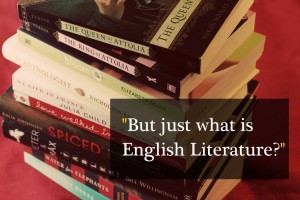“But just what is English Literature?”
While this is one of many potential questions about the universe, life and everything that strikes fear into the heart of prospective English literature students, I feel that I can now appreciate its intent. It intrinsically links literature with the notion of identity and how they sculpt one another.
However, I am not writing a guide on how to decode the admissions system. I am instead concerned that if one asks “what is English literature?”, the only acceptable answer will be one that privileges a prescriptive, pre-moulded list over individual opinion and tastes.
In order words, the tie that literature has with identity is not only present in the texts but is a phenomenon present within students themselves. Therefore, the news of a new English curriculum in 2015 makes me feel slightly uneasy. Changing the literature one reads not only shapes the syllabus but potentially changes the identity of the reader as well.
Considering that the consultation period has just passed, it is difficult to completely judge the impact of the current situation. For instance, people highlight Education Secretary Michael Gove’s desire to centralise the subject around “Dryden, Pope, Swift, Byron, Keats, Shelley, Austen, Dickens and Hardy” in a speech in 2010. It seems that if you replied to the question “What is English Literature?” with “feminist, not English, modern, short books, graphic novels” you might as well wave goodbye to the interviewer and ring up Clearing.
However, looking at the KS4 syllabus provided in February this year, it seems like the tide is already turning. Whilst, unlike the 2010 speech, there is mention of “seminal world literature” and post war texts, the increase to two Shakespeare plays and the specificity of Romantic poetry and a nineteenth century novel appears to re-establish the same purist authority of the “classics”.
Indeed, the classics should be there, but so should the mass cultural change in the 20th and 21st centuries, of which we are a part of. What impact will this focus on “English” literature have on children’s identities?
However, this is perhaps the time to stress that I am not adverse to the concept of changing syllabuses as a general rule. I do welcome the concept of trying to reconnect children with books and the subject I love.
The particular criticism of the popularity of the novella Of Mice And Men within the GCSE programme highlighted some problems that I noted whilst studying the book itself. If everybody studies the same book year upon year, there is the dangerous potential for the book to become objectively analysed. All essays regurgitate Yorknotes: “The rabbits represent Lenny, the red represents Curly’s wife’s seductive nature” etc. etc.
I think, whilst grammar and spelling is important, we need to focus on analytical skills. Students need to be able to be told not to merely get a guide telling them what a book means and struggle to remember the “right” answers. They need the interpretive skills to be able to open the book to any page and speculate why it means that.
Unfortunately, there are aspects within the new curriculum, which I feel will merely exacerbate the barrier to analytical reading. The recent government initiative, Poetry by Heart, is just one part of Gove’s dream to have children blindly reciting poetry. Whilst I think it’s all very well to introduce children to the poetic joys of life, I often think that this encourages the reciting aspect of learning whilst missing the rich analytical side to poetry.
A good example of this would be in a seminar I had last term in which the tutor discussed how often nationalistic songs are derived from poems of completely different meanings. How can we complain that children aren’t getting a rigorous education, when we are simultaneously promoting the regurgitation of literature. Don’t we need to consider its meanings, history, and context?
Whilst I do see value in reading just for the love of reading, I hope that we don’t use the argument of “oh Wordsworth still carries with me when I’m doing my taxes” to excuse children from learning the more complex skills of studying literature. Cheese and pineapple on a stick and orange squash make me sentimental, but I won’t be pushing for them to be served in the canteen for nostalgia’s sake.

Comments